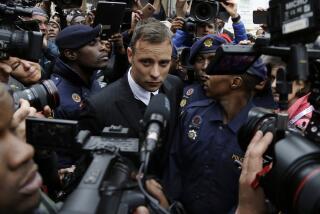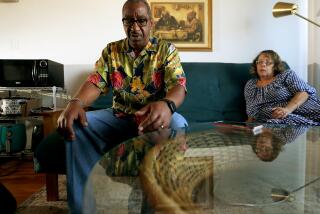After 27 Years in S. Africa Prisons, ‘Spirits Are Marvelous’ : For Mandela at 71, Freedom Looms Larger Than Ever
- Share via
PAARL, South Africa — In the heart of South Africa’s cool, pine-scented wine country, Nelson R. Mandela rises early each morning to work out on his exercise bicycle. He spends the rest of the day reading newspapers and books, writing in his journal or listening to radio or TV newscasts.
He has no telephone, but, for the first time since he went to prison in 1962, he sees frequent visitors from the outside, including political associates, and a few of them are allowed to stay for lunch.
Precisely at 4 p.m., though, the fence around Mandela’s large ranch-style house is locked, and the world’s most famous prisoner--a beacon of hope to millions of South Africa’s voteless blacks--is left with his thoughts.
“His spirits are marvelous,” said Fatima Meer, his biographer, who met with Mandela last week. “We can all take a lesson from him. He’s the one who inspires us when we go in, not the other way around.”
Mandela turns 71 today, after the most tumultuous year of his 27 in prison, a year in which the government launched an attempt to demythologize Mandela and improve its own international image by slowly and publicly removing restrictions on the leader of the outlawed African National Congress. Now Mandela is as close as he’s ever been to freedom.
A year ago, Mandela lived in a prison cell at Pollsmoor Prison in Cape Town, where he was restricted to 40-minute visits from a handful of family and friends. But then Mandela contracted tuberculosis, was hospitalized and, after recuperating at a private Cape Town clinic, was transferred to a spacious house on the grounds of Victor Verster Prison Farm here, about 40 miles from Cape Town.
His house, usually reserved for white prison officials rather than captives, has three bedrooms, a gymnasium, a lounge and a swimming pool with sweeping mountain views. It’s a lonely existence, but his visitation rights have been loosened considerably. In recent weeks, for instance, he has met for hours at a time with men the government considers dangerous figures in the ANC, Govan Mbeki and Harry Gwala.
And more than a dozen family members, including his wife, Winnie, plan to gather here today to celebrate his birthday.
Government officials say Mandela’s release, while not possible before September’s elections, may nevertheless be only a matter of months away.
Earlier this month, Mandela was taken to the presidential mansion for tea with the head of the white minority-led government, President Pieter W. Botha. Although largely symbolic, their first face-to-face meeting was a reminder that top government officials are worried about growing international pressure to release Mandela and negotiate with the country’s black leaders.
The effect of Mandela’s release is the biggest unknown factor in South Africa’s future, political analysts say. Looked up to by millions of black South Africans, Mandela is considered a unifying force among blacks--as well as a strong bridge between blacks and the country’s fearful whites.
But conservative government officials worry that a free Mandela could trigger unrest in the country--particularly if the three-year-old state of emergency, preventing most black political gatherings, and the ban on groups such as the ANC remain in place.
Other senior officials worry that Mandela’s incarceration continues to give the world a club with which to hammer South Africa. And, those officials warn, Mandela’s death in prison would set back, perhaps irretrievably, any hope of negotiations with the black majority in South Africa.
Mandela himself has told friends he does not expect to be freed soon.
Recent visitors say the nationalist leader, serving a life term for sabotage and conspiracy to overthrow the government, is extremely fit, intellectually sharp and highly conversant in current events.
“He never takes an extreme position on world affairs,” Meer said.
Mandela recently completed an advanced law degree by correspondence from the University of South Africa.
Few of South Africa’s blacks have ever seen Mandela. But those who have served time in prison with him invariably mention his almost regal bearing: graying, 6 feet tall, with a precise English accent.
“Mandela is like that. When he sits down, you feel as if a king has sat down,” says one former Robben Island inmate.
A. B. Claasen, a black man who pumps gas at the service station down the road from Victor Verster Prison, is typical of those who have never laid eyes on Mandela.
“Things will change in South Africa when Nelson is released,” he said last week. “And they’ll change for the better.”
More to Read
Sign up for Essential California
The most important California stories and recommendations in your inbox every morning.
You may occasionally receive promotional content from the Los Angeles Times.











